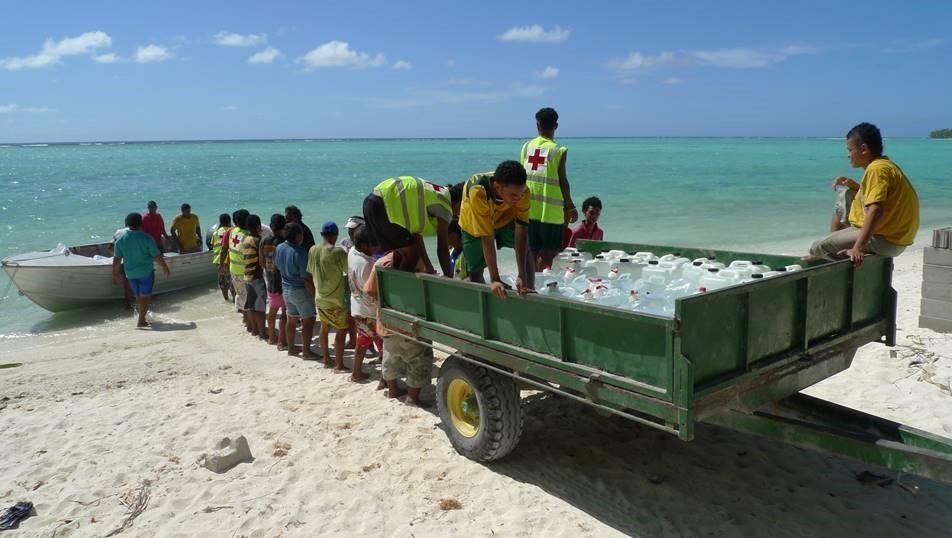Regional collaboration is essential to managing the impacts of droughts and floods across the Pacific.
This was the finding of the Fourth Pacific Meteorological Council (PMC-4) this week, as it took a step towards the better management of floods and droughts through the establishment of a regional expert panel on hydrology.
Hydrology is the branch of science concerned with the behaviour and movement of the earth’s fresh water, and an understanding of hydrological processes is essential in managing the droughts and floods that regularly impact on the health and livelihoods of Pacific communities.
Meeting at PMC-4 in Honiara, Solomon Islands, Directors of Pacific National Meteorological and Hydrological Services considered a paper on the issue, jointly prepared by the Pacific Community (SPC), the Secretariat of the Pacific Environment Programme (SPREP), and the World Meteorological Organisation (WMO).
Addressing the Council meeting, SPREP’s Espen Ronneberg and SPC’s Peter Sinclair outlined the challenges in maintaining effective hydrological services across the Pacific, and the benefits of a collaborative approach through the establishment of a dedicated hydrology panel under the framework of the PMC.
“While support for hydrological services continues to be provided to Pacific Island Countries and Territories through a range of national, regional and international programmes, more sustained support is needed,” Mr Ronneberg said.
Mr Sinclair noted the strong linkages that exist between hydrology and meteorology, and the benefits to improving coordination and collaboration between the sectors. “Closer collaboration between hydrologists and meteorologists is needed to support the Pacific’s efforts in climate change adaptation and disaster risk reduction,” he said. “This collaboration is particularly important for the development of better warning and management systems for floods and drought.”
Mulipola Tainau Ausetalia Titimaea, Assistant Chief Executive Officer of the Meteorology Division of Samoa’s Ministry of Natural Resources and Environment, welcomed the PMC’s endorsement of the expert panel. “Apart from providing advice and guidance to the PMC, the panel is needed to assist with the development and new programmes and initiatives to support the capacity needs of hydrological services in the Pacific,” he said.
This collaborative approach to addressing the capacity needs of Pacific Island Countries and Territories follows the signing of a Memorandum of Understanding on 27 July between SPC and SPREP, aimed to further strengthen collaboration efforts for the resilient and sustainable development of the Pacific region.
The Fourth Pacific Meteorological Council is being held in Honiara, Solomon Islands from the 14 – 17 August co-hosted by the government of Solomon Islands, Government of Australia through the Climate and Oceans Support Programme (COSPPac) and Pacific Australia Climate Change Science and Adaptation Planning Programme (PACCSAP), Government of Finland, National Ocean and Atmospheric Administration (NOAA), SPREP, WMO and United Nations Development Programme through the Resilience in the Pacific (SIDS) project.
This is being followed by the Second Pacific Meteorological Ministers Meeting on the 18 of August.
Media contacts:
Dave Hebblethwaite, Water Security and Governance Coordinator, [email protected] or +679 9983059
Peter Sinclair, Water Resources Monitoring and Assessment Coordinator, [email protected] or +679 9922113
Azarel M Maiai, COSPPac Capacity Development Officer SPREP, [email protected] or +685 21929 ext 300
About Us:
SPC is the principal scientific and technical organisation in the Pacific region, supporting sustainable development since 1947. It is an intergovernmental development organisation owned and governed by its 26 country and territory members.
About SPREP:
The Secretariat of the Pacific Regional Environment Programme (SPREP) is charged by the governments and administrations of the Pacific with the protection and sustainable development of the region's environment.
